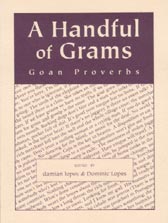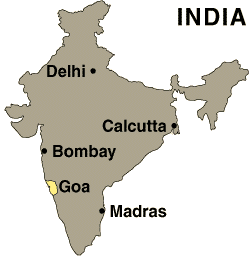

Editor
A Handful of Grams: Goan Proverbs
 Edited by damian lopes and Dominic McIver Lopes
Edited by damian lopes and Dominic McIver LopesForeword
‘Cheeky fellow, you know to talk.’This was my grandmother’s assessment of me when I explained how the dog came to eat the last mango or why watching Star Trek should come before preparing for visitors. Her words were meant as a mild rebuke, but they were spoken with a smile betraying her appreciation of verbal ingenuity. I heard them with a smile of my own, because their grammar belied their meaning, and yet they succeeded in humbling me. I recognized them as literally translated Konkani, a rapid and laughing speech those of my grandmother’s generation spoke among themselves, but lost to their away-born grandchildren. Konkani was the language I did not know to talk.
If I could not speak Konkani, I gained a sense of its spirit from my grandmother’s translations. These were often idioms and proverbs whose humour and impudence scuttled any chance of a come-back in my reserved Canadian English. Depending on context and tone, ‘You know to talk’ could mean ‘Your verbal evasions aren't missed on me, young man’ or ‘You're all talk and no action’ or even ‘People who live in glass houses.’ For emphasis, my grandmother might have added, ‘How you stayed in your mother’s stomach!’ Too much talk is the sign of an upstart. Yet Konkani proverbs are all about the pleasure of talk, in using it to tease, to scold, to cajole, perhaps even to advise.
 Konkani is the language of India’s Konkan Coast, which stretches from Bombay south to Mangalore. At the midpoint is Goa, a trading centre that became the hub of the Portuguese empire in Asia during the sixteenth century. Many Goans converted to Catholicism, adopted western dress, and laced their language with Portuguese. In recent decades Goans have migrated to East Africa, the Persian Gulf, and the West, so that those overseas now outnumber those in India. But unlike some other immigrants, Goans do not teach their children their language. Few Goans living abroad know more than a few phrases of Konkani.
Konkani is the language of India’s Konkan Coast, which stretches from Bombay south to Mangalore. At the midpoint is Goa, a trading centre that became the hub of the Portuguese empire in Asia during the sixteenth century. Many Goans converted to Catholicism, adopted western dress, and laced their language with Portuguese. In recent decades Goans have migrated to East Africa, the Persian Gulf, and the West, so that those overseas now outnumber those in India. But unlike some other immigrants, Goans do not teach their children their language. Few Goans living abroad know more than a few phrases of Konkani.
This collection is inspired by the thought that these proverbs are seeds of Goan culture, and bear transplantation into English, the language of Goans worldwide. They also offer non-Goans a taste of a unique heritage that draws equally on east and west. As the proverb says, ‘The rice of home cooks in the water of many countries.’
- DML
